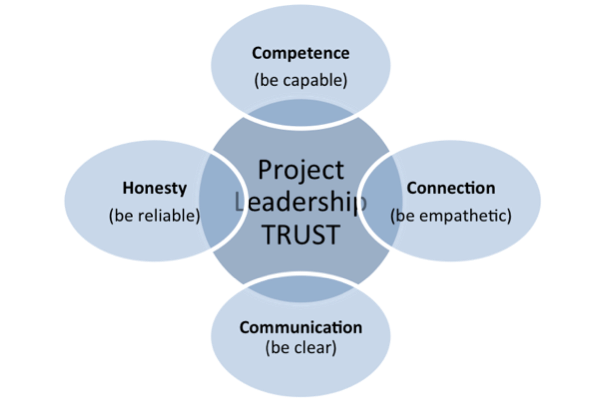For project and change managers a high-trust environment is particularly important, as the very nature of our job is to lead people through a period of high uncertainty and change. In addition we often interface with people who are more senior than us and who don’t report to us. As we can’t rely on hierarchical reporting lines to move things forward, we have to make use of our interpersonal skills and our ability to influence people in more subtle ways. If we want people to trust us and follow us, we have to make them feel safe; keep our promises and communicate with absolute clarity.
When trust is lacking people tend to pull back and withdraw rather than cooperate. They start to doubt and become cynical. Lack of trust on projects comes about when managers fail to communicate important information, deliberately withhold information or when they are not truthful, reliable or consistent. Actions speak louder than words, so if something is not appropriately done or communicated it will create barriers even if the intentions were genuine.
The four components of trust building
The good news is that there is a method for building trust – and that trust can be regained even in situations where it is lacking. It does however require time, energy and conscious effort to do so. Let’s examine the four components of how to best build trust; Competence, Honesty, Connection and Communication.
Honesty – The second major component of trust is honesty. Many project managers are capable of excellent work but let people down unexpectedly when they come under pressure. They promise too much and trust is broken when they later have to admit that they couldn’t deliver the work they promised. Don’t fall into that trap. If you are in a situation where you feel pressurized to saying yes without wanting to, take time out and come back with an answer later. Or give small allowances by saying “we can’t do A but we can do B”. Be strong and have an open conversation with people so that they don’t expect something, which is unrealistic. Project leadership is about doing the right thing, and that sometimes means telling the unpleasant truth and saying things the way they are. In the long run your stakeholders will respect you for being realistic and for having their best interests at heart. Being overly optimistic and promising too much helps no one.
Connection – The ability to deeply connect with people, relate to them and show them that you care is a third factor in building trust. In order to connect with people, you have to see them as individuals and spend time understanding their situation. Show them that you care and that you are able to put yourself in their shoes. That is the basics of empathy; being able to view situations and responses from the other person’s perspective. It is not enough to have a superficial relationship. Real mastery and trust building comes from understanding people’s psychology; their values, beliefs and identity. A good way to get started is to become an empathetic listener and to give people your full attention. But it’s also important to share something about yourself and to show openness and willingness to cooperate.
Communication – The fourth major component in building trust is the ability to communicate clearly and effectively. Communication cannot make a person trust you if you are basically untrustworthy, but it can help create a culture in which trust can thrive. Jeff Wilcox from Lockheed Martin, said at ICCPMs 4th Annual Research and Innovation Seminar that he had never seen a project fail that did not fail as a result of poor communication. PMI’s Pulse Report, The High Cost of Low Performance, reveals that poor communication is indeed a major factor in half of all projects that fail. In order to address this you need to become a deliberate communicator. Purposefully influence the perception and behavior of the projects’ stakeholders and don’t leave anything to chance. Communicate openly, honestly and frequently and ensure that your messages are as accurate and clear as possible.
On a scale from 1 to 10 how good are you at building trust with people who you work with? In my experience, lack of competence isn't the main reason why project and change managers struggle. They struggle because they overpromise, and because they don’t take the time to truly connect and clearly communicate with their most important stakeholders. Don't let that happen to you!









 RSS Feed
RSS Feed